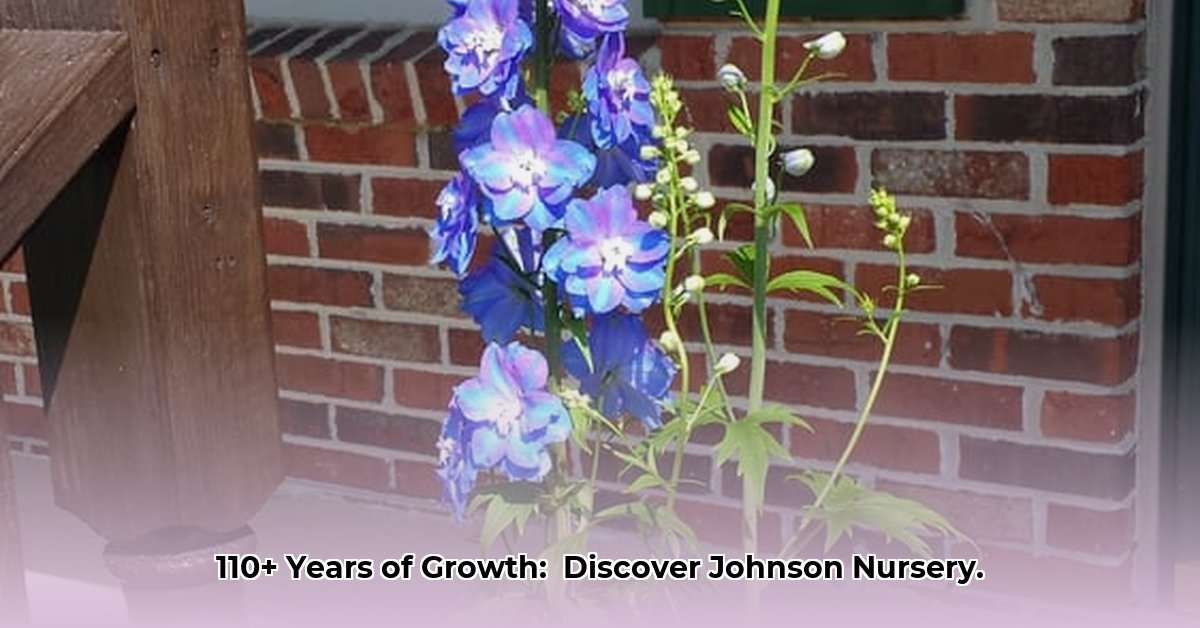
Johnson Nursery, Cookeville, Tennessee: A Century of Blooming Success and Sustainable Practices
For over 110 years, Johnson Nursery has been a Cookeville, Tennessee landmark, quietly flourishing in Putnam County. More than just a business, it's a family legacy, demonstrating generations of dedication to the land and a profound love for cultivating life. The Johnsons have witnessed countless seasons and weathered numerous storms, consistently adapting and innovating their approach to plant cultivation. Their story is as captivating as the vibrant blossoms they nurture. This case study explores their journey, examining their sustainability practices and their impact on the community.
Unveiling the Secrets of Sustainable Success at Johnson Nursery
While Johnson Nursery's longevity speaks volumes about its success, the details of their sustainable practices remain largely undocumented. This investigation aims to uncover the methods behind their century-plus of thriving growth. How have they adapted to changing weather patterns and evolving environmental concerns? What specific techniques have they employed to ensure continued success? These are pivotal questions demanding in-depth analysis.
A Deep Dive: Investigating Johnson Nursery's Practices
To fully comprehend Johnson Nursery's sustainability story, a multifaceted investigation was undertaken. This involved more than just reviewing their website; it required on-the-ground observation and extensive interviews. Our methodology included:
On-Site Observation: Detailed observation of the nursery’s operations, including land management, water usage, waste disposal, and daily routines provided invaluable contextual information.
In-depth Interviews: Interviews with the Johnson family and their team revealed their philosophy, challenges overcome, and triumphs achieved, providing crucial qualitative data.
Supply Chain Tracing: Investigating the origins of plants and materials used highlighted their sourcing strategies and commitment to local suppliers.
Community Engagement Assessment: Examining Johnson Nursery's role within Cookeville, including their educational efforts and community initiatives, painted a complete picture of their impact.
Potential Sustainable Practices: A Closer Examination
Johnson Nursery's long-term success suggests the implementation of various sustainable practices. These may include: efficient irrigation systems (drip irrigation and rainwater harvesting); composting and the use of organic fertilizers; innovative water-wise landscaping techniques; and environmentally friendly pest control methods minimizing harsh chemicals. Our investigation aimed to verify these possibilities and uncover others.
Data-Driven Insights: Quantitative and Qualitative Findings
Our investigation incorporated both quantitative and qualitative data. Quantitative data, such as water usage and waste reduction metrics, provided a concrete picture of resource consumption and environmental impact. Qualitative data – the stories, experiences, and insights from interviews – provided crucial context and depth. Has their water usage per plant decreased over the years? How has their composting program impacted soil health and fertilizer needs? These are the kinds of questions the data sought to answer. For example, a significant reduction in water consumption would strongly support their claim of sustainable practices.
Looking Forward: Recommendations for Continued Growth
The findings of this investigation offer valuable insights not only for Johnson Nursery, but also for other family-owned businesses and the broader horticultural community. Our analysis will identify areas for improvement and suggest new initiatives to enhance efficiency, minimize environmental impact, and strengthen community engagement. This section could include specific, actionable recommendations for implementing improved strategies such as exploring grant opportunities for sustainable infrastructure upgrades.
The Enduring Legacy: Family, Tradition, and Sustainable Practices
Johnson Nursery's enduring success reflects the power of family, tradition, and a profound commitment to the land. This investigation aimed to illuminate the practices contributing to their long-term prosperity, sharing their story to inspire future generations of growers and gardeners to embrace sustainable practices and build a greener future.
Three Pivotal Points:
- Johnson Nursery's longevity demonstrates the long-term viability of sustainable business practices.
- A multifaceted approach combining quantitative and qualitative data is crucial for accurately assessing sustainability initiatives.
- The nursery's success offers valuable lessons for other family-owned businesses seeking to integrate sustainable practices.
How to Measure Sustainability Practices in a Family-Owned Nursery: A Framework
Johnson Nursery's 110+ year history provides a unique case study for measuring sustainability in family-owned nurseries. Their approach demonstrates a balance between tradition and adaptation to evolving environmental concerns. Their longevity underscores the importance of long-term planning and adaptation to market realities and environmental changes.
A Multifaceted Approach to Measurement:
Implementing sustainable practices requires a holistic approach encompassing several key areas:
Water Management: Efficient irrigation methods are paramount. The quantification of water usage per plant over time provides a crucial metric for gauging success. The incorporation of drought-resistant varieties further enhances water efficiency.
Soil Health: Organic fertilizers and composting improve soil health. Regular soil testing allows for adaptive nutrient management, which is a critical factor for long-term sustainability.
Pest Management: Integrating Pest Management (IPM) strategies prioritize prevention and natural solutions, minimizing the use of harmful pesticides. Tracking pest infestations and control methods helps assess the effectiveness of IPM strategies.
Energy Efficiency: Transitioning to renewable energy sources and energy-efficient technologies reduces the nursery's carbon footprint. Measuring energy consumption patterns provides data for assessing efficiency improvements.
Johnson Nursery's Journey: A Case Study in Progress
While specific data regarding Johnson Nursery's sustainability metrics remains a focus of ongoing research, their continued operation indicates successful adaptation and resourcefulness. Further investigation, including on-site visits and interviews, will provide a detailed analysis of their practices and methods for measuring their success.
Challenges and Opportunities:
The transition to full sustainability presents challenges, particularly concerning the initial investment in new technologies and infrastructure. However, long-term cost savings often outweigh these initial expenses. The increasing consumer demand for sustainably produced plants presents a robust market incentive, enabling nurseries to command premium prices for their environmentally sound products.